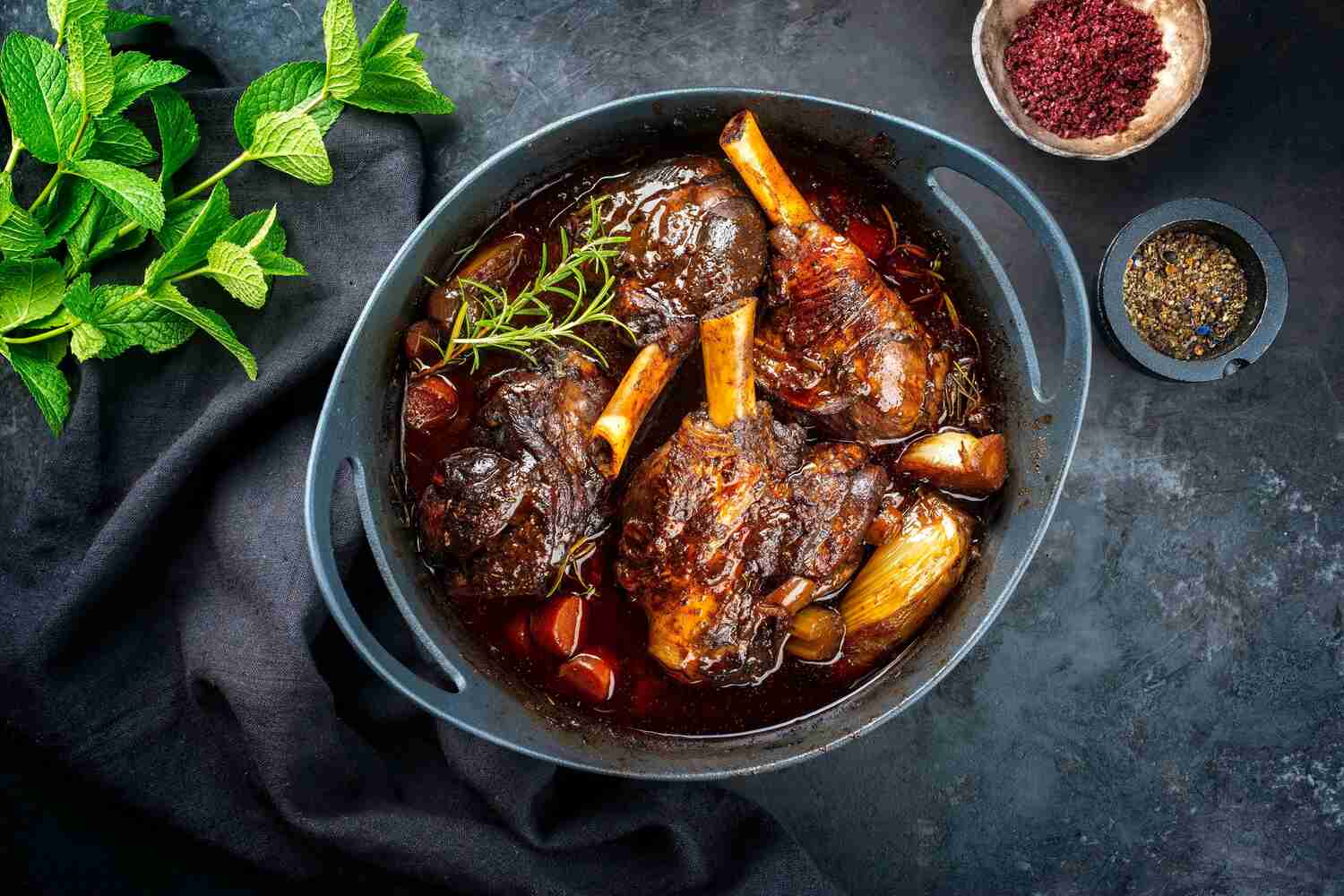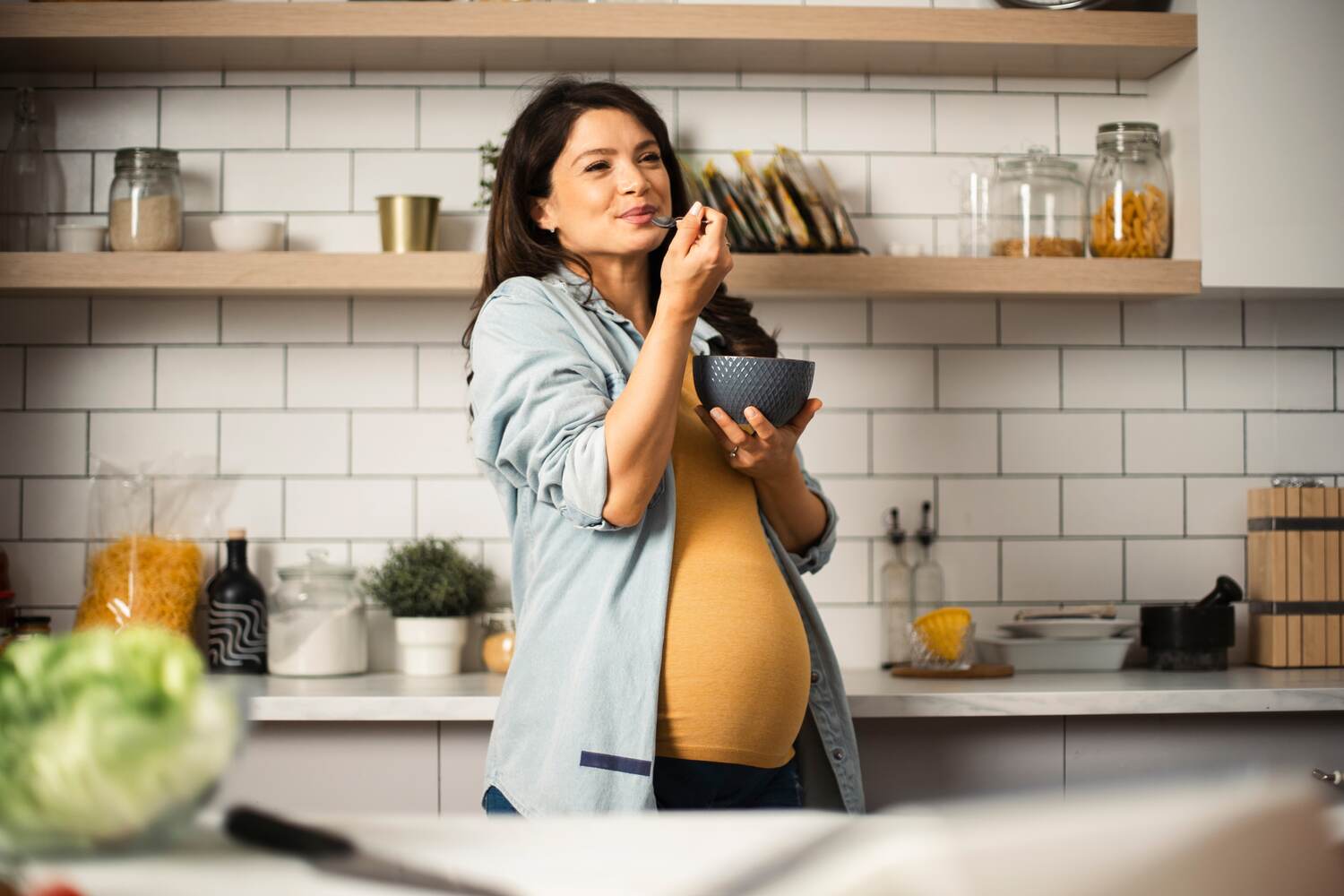
Protein in pregnancy is mandatory, it not only helps in pregnancy weight gain but also helps in optimizing fetal growth. Beans, pulses, fish, eggs, meat, poultry, greek yogurt, cheese, and nuts are some protein sources. Lamb, a nutrient-dense meat, is also very rich in protein, iron, and B12. Lamb meat comes from a sheep younger than 1 year. Compared to mutton, lamb is tenderer, milder, and slightly pinkish. Lamb during pregnancy safeguards from illnesses. Let’s stay connected throughout the article to learn about its safety, benefits, risks, and side effects during pregnancy.
A pregnant woman can include lamb in her diet when it is well-cooked. It’s necessary to consume moderate amounts of meat and meat products in a pregnancy diet. Pregnant women should consume around 71 grams of protein every day. Vegetarian pregnant women can get enough protein by eating low-fat dairy like cheese, tofu, nuts, and beans. A plant-based diet is also healthier.
In This Article
- Nutritional Value Of Lamb
- Health Benefits of Eating Lamb During Pregnancy
- Risks of Eating Lamb During Pregnancy
- Side Effects of Having Lamb During Pregnancy
- Precautionary Measures to Take While Having Lamb During Pregnancy
- FAQ’s
Nutritional Value Of Lamb
Lamb provides an excellent source of protein, iron, zinc, phosphorous, selenium, and vitamins. It also delivers healthy fats. You should limit your lamb consumption, following the Department of Health and Social’s advice to intake 70 grams. The approximate nutritional value of 70 grams of cooked lamb has the following composition.
| Nutrients | Value |
| Protein | 22 g |
| Calories | 160 calories |
| Fat | 3 g |
| Cholesterol | 65 mg |
| Sodium | 55 mg |
| Iron | 1.8 mg |
| Zinc | 3.5 mg |
| Vitamin B12 | 2 mcg |
Health Benefits of Eating Lamb During Pregnancy

Lamb is high in protein and other essential vitamins which are necessary during pregnancy. Here are a few more health benefits of eating lamb during pregnancy.
1. Nutrient-Rich
Lamb is a high-value nutrient provider, supplying essential nutrients such as B6, B12, iron, zinc, protein, and selenium. In addition to providing these nutrients, consuming lamb can also stimulate blood cell formation, speed up metabolism, and boost the immune system. Iron-rich foods like lamb (red meat) are crucial to prevent anemia (1).
2. Vitamin B12
Lamb during pregnancy is an excellent source of protein and also rich in Vitamin B12, which not only helps in the production of red blood cells but also maintains the health of the nervous system.
3. Fullness
The relatively high protein and fat content in lamb contribute significantly to the sensation of fullness—consequently, these help in reducing the consumption of other foods.
Risks of Eating Lamb During Pregnancy
A healthy diet during pregnancy requires moderate amounts of meat and meat products. Here are a few risks of consuming red meat during pregnancy.
- Raw or undercooked meat like patties, will harm the baby in the womb and may lead to miscarriage. The lamb should be without any blood or pinkish form.
- A research study suggests that consuming extremely processed red meat or lamb can increase the risk of having gestational diabetes (1a).
- Consuming raw or undercooked meat can pose the risk of having bacterial infections during pregnancy.
Side Effects of Having Lamb During Pregnancy

The proverb says “Anything in moderation.” It highlights balance and avoiding excess. Even when it comes to eating lamb, moderation is important. Here are some common side effects of eating lamb during pregnancy
1. Indigestion
When a woman gets pregnant there will be a lot of hormonal changes in her body. There might be pressure on the digestive organs. Pregnant mommies may experience morning sickness or sensitivity to certain types of food. To make it easier, they can eat less cooked meat and stay hydrated to avoid any heartburn or cramps.
2. High Saturated Fat
Saturated fats are one of the unhealthy fats, most often solid at room temperature. Foods like red meat, butter, coconut oil, and cheese. American Heart Association recommends limiting saturated fats. These solid fats increase the level of cholesterol and lead to the risk of heart disease.
3. Bacterial Presence
Raw or undercooked meat contains parasitic infections especially concerning for pregnant women. This will cause cramps and harm to the developing fetus in the womb. It may also lead to miscarriage. Better raw lamb or undercooked lamb should be avoided for unwanted complications.
4. Avoid Liver Products
“The Pregnancy Book” by St George’s University Hospitals NHS, UK says, “Don’t eat liver products like liver sausage or liver pate, as they may contain a lot of vitamin A. Too much vitamin A can harm your baby” (2). It is required for pregnant women not to take high-dose multivitamin supplements or any supplements containing vitamin A (3).
Precautionary Measures to Take While Having Lamb During Pregnancy
It would be best if you cooked Lamb until it reaches an internal temperature of at least 160℉ (71℃) to eliminate the risk of bacteria during pregnancy. Using a food thermometer is helpful. The protein myoglobin determines the color of the lamb. People call Lamb red meat because it contains more myoglobin than fish and chicken.
There is a high protein in lamb, but we should make clean and healthier choices before buying lamb. Always buy a lump of lean meat, it can contribute to and heart-healthy diet. Here are some of the precautionary measures to take before considering eating lamb during pregnancy
1. Healthy Purchase
- Always buy fresh lamb and ask for a lean cut if possible.
- If you’re buying a packed lamb, do check for the nutrition list and compare it with the other
- Try to limit processed meat products such as salami, pate, and sausages because they are high in fat and salt
- Check on manufacturing and expiring date as well
2. Storing and Freezing
- Store lamb/meat in steel containers without touching the other food on the fridge shelf
- Keeping cooked lamb and raw lamb separate is a must. Only reheat cooked meat
- Wash the utensils, and plates clean to avoid any bacterial disease
- Freeze it before the ‘use by’ date and label it to avoid confusion
- Defrost meat, only if you are cooking without any delay
- Do not reheat lamb frequently because it may lead to food poisoning
To wrap up, this article serves as valuable information with general guidelines. It’s crucial to remember that every individual health may vary. Lamb during pregnancy helps in the development of the fetus and helps in increasing hemoglobin levels. For personalized understanding and follow-ups, it’s mandatory to schedule a medical consultation. A healthcare provider ensures that you receive the most up-to-date information based on your medical history and needs. Your health is paramount, especially when you are carrying a little life inside you.
FAQ’s
1. Is it Safe to Eat Cooked Lamb?
It is safe to eat a moderate amount of well-cooked lamb. It is important to ensure meat products are fully cooked, especially during pregnancy.
2. Can I Eat Pink Lamb While Pregnant?
This pink color can be natural in some types of meat such as lamb, pork, or beef. It’s only recommended to eat after it reaches the internal temperature level of a well-cooked lamb. The raw or undercooked lamb must be avoided
3. Can I Eat Medium-Cooked Lamb When Pregnant?
It’s generally advisable to avoid medium-cooked lamb, to minimize the risk of foodborne illness and ensure safety.
References
- Benefits and Risks Associated with Meat Consumption during Key Life Processes and in Relation to the Risk of Chronic Diseases – [https://www.ncbi.nlm.nih.gov/pmc/articles/PMC9318327/]
- The Pregnancy Book – [https://www.stgeorges.nhs.uk/wp-content/uploads/2013/11/Pregnancy_Book_comp.pdf]
- Vitamin A and Pregnancy: A Narrative Review – [https://www.ncbi.nlm.nih.gov/pmc/articles/PMC6470929/]
